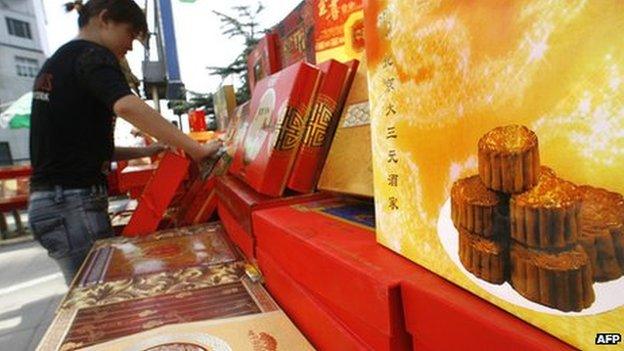China media: Mooncake corruption
- Published

Mooncakes are traditionally bought as gifts during the Mid-Autumn Festival
Media back the government's decision to ban officials from using public funds to buy mooncakes as gifts during the Mid-Autumn (or Moon) Festival.
Giving mooncakes to relatives and business associates is an integral part of the festival, which is being celebrated on Monday across China.
Mooncakes are traditionally filled with salted egg yolk and sweet lotus paste, and symbolise the moon.
However, the festive season also turns into opportunities for officials to misuse public funds to purchase expensive mooncakes as gifts, external.
This prompted the authorities to issue a strong warning against the practice ahead of the festival.
As a result, several media outlets have observed a drop in sales of expensive mooncakes and other luxury items.
"This year many officials will think thrice before accepting gifts because of the government's anti-corruption drive," says the Shanghai Business Daily, external.
The China Daily, external notes that expensive boxes of mooncakes have been pulled off from the shelves of many supermarkets.
Zhou Shuzhen, a professor of clean-governance with Renmin University of China, tells the daily that the government is "expected to regain the public's trust" with the implementation of its frugality rules.
"What the top anti-graft watchdog banned is not just a small mooncake, but a type of corrupt behaviour that was hated by the people," she says.
Military symbols
In other news, media and netizens call for a ban on wearing controversial military symbols in public after a fight between a man and an "angry crowd" over the issue.
A young man, wearing a shirt printed with an image of the flag used by the Japanese army until the end of World War Two was confronted by an angry crowd in Mount Taishan, Shandong province, on Saturday.
The Xinhua News Agency, external notes some netizens' criticism of the crowd for having "narrow-minded nationalistic views".
Commenting on the issue, the agency says "going after after individual freedom... is extremely foolish".
The Beijing Youth Daily, external and The Beijing Times, external, however, raise questions over the violence displayed by the crowd and calls for a ban on controversial military symbols.
"Tearing off the T-shirt infringes the rights of the person. The public can express their opinion, but should not take law into their own hands… Instead, as one of the biggest victims in World War Two, China should legislate a ban on the spread of such symbols," says The Beijing Times, external.
BBC Monitoring reports and analyses news from TV, radio, web and print media around the world. For more reports from BBC Monitoring, click here. You can follow BBC Monitoring on Twitter, external and Facebook, external.